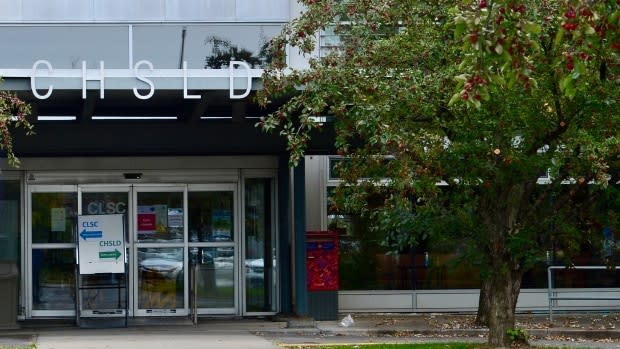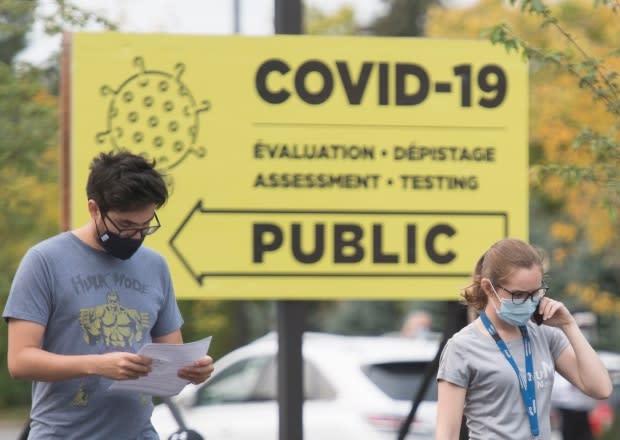Experts unsure whether Quebec's heath-care system can withstand latest surge of COVID-19
With cases of COVID-19 increasing in Quebec at a rate not seen since the spring, health experts are urging the government to take more drastic measures in order to spare the beleaguered health-care system from further stress.
On Sunday, Quebec reported 896 new cases, a figure close to the worst days in April and May. Hospitalizations and deaths, though, are currently much lower than they were during the first wave.
Nevertheless, hospitalizations have risen 46 per cent over the past week. There are currently 216 COVID-19 patients in hospital, including 41 in intensive care.
According to experts, the lower hospitalization numbers can be explained by the larger percentages of young people who are testing positive for the disease. At that age, they are less likely to develop complications.

But hospital doctors in Montreal say they are in fact admitting younger patients, which potentially poses a new set of challenges for the health system.
Dr. François Marquis, head of intensive care at Maisonneuve-Rosemont Hospital in Montreal, said the younger patients he's seen have taken longer to recover.
"We could wind up, in this second wave, with a problem where a small number of young people fill our beds in intensive care because they don't die, but they don't get better. They're stuck between the two," Marquis said in an interview with Radio-Canada.
"That's a reality the population has not understood and that young people, unfortunately, have not understood."
Dr. Matthew Oughton, a physician of infectious diseases at Montreal's Jewish General Hospital, said he expects hospitalizations to increase more rapidly in about a month, as young people transmit the virus to older generations.
"We're going to be back into the sort of crunch that we know many hospitals in Quebec were in back in the later part of March and April," Oughton said.
Concern again about long-term care
Another area of concern as cases rise is the fate of long-term care homes.
In the first wave of the pandemic, hundreds of publicly run facilities (known as CHSLDs) had outbreaks, which killed nearly 4,000 people.
The government promised sweeping changes to protocol and staffing levels to prevent a similar disaster from taking place again. But in recent days, outbreaks at a number of CHSLDs and seniors homes have worried observers.
Visits had to be suspended at the CHSLD Idola Saint-Jean in Laval Saturday, after 11 patients and seven employees tested positive for the virus.
Meanwhile, 10 people tested positive at Residence l'Initial in the Outouais region and patients at the CHSLD Herron —where 38 people died in the spring — are once again in insolation after a staff member tested positive there.
"This is extremely concerning. This shouldn't be happening anymore," said Dr. Cécile Tremblay, an infectious disease specialist at the Université de Montréal hospital.
"The government was firm on this and said it wouldn't happen anymore, but it is happening again."
Tremblay said that while the government did hire more patient care attendants, long-term care homes are still dealing with a shortage of nurses and staff-to-patient ratios are less than ideal.

Need tougher measures, experts say
In an effort to slow the spread of COVID-19, the Quebec government has been urging people to avoid all social gatherings, especially in private homes, for the next month.
"The high increase in cases is mainly associated to community transmission of the virus," Health Minister Christian Dubé wrote on Twitter, Sunday.
Tremblay said the virus is spreading out of control, and suggested the government consider taking tougher measures to prevent the death toll from increasing. Making masks mandatory for students inside the classroom was among the measures she proposed.
"It is extremely important that people understand we are heading straight for a second wave that will be at least as bad as the first one, if not worse," she said.
Oughton also said the government needs to do more. Simply asking people to reduce their contacts, he said, hasn't been enough.
"It's a request, but it doesn't have any force to it. And as a result, I have a feeling that some people don't see this as being anything more than a suggestion or a recommendation," he said.
"Right now the message isn't getting through with sufficient clarity. The government needs to take firm and clear action to explain to people why this is such an issue."


